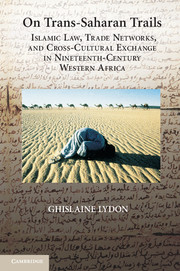 On Trans-Saharan Trails
On Trans-Saharan Trails Book contents
- Frontmatter
- Contents
- Acknowledgments
- Note on Language
- List of Abbreviations
- Glossary
- Maps
- 1 “Making History” Across the African Divide
- 2 Trans-Saharan Trade in the Longue Durée
- 3 Markets and the Movement of Caravans: Nineteenth-Century Developments
- 4 Guelmīm and the Wād Nūn Traders
- 5 The Organization of Caravan Trade
- 6 Business Practice and Legal Culture in a Paper Economy of Faith
- 7 Trade Networks and the Limits of Cooperative Behavior
- 8 On Trans-Saharan Trails
- Appendix 1 Nineteenth-Century Events
- Appendix 2 Pillaged Caravans Reported in the Chronicles
- Bibliography
- Index
7 - Trade Networks and the Limits of Cooperative Behavior
Published online by Cambridge University Press: 02 July 2009
- Frontmatter
- Contents
- Acknowledgments
- Note on Language
- List of Abbreviations
- Glossary
- Maps
- 1 “Making History” Across the African Divide
- 2 Trans-Saharan Trade in the Longue Durée
- 3 Markets and the Movement of Caravans: Nineteenth-Century Developments
- 4 Guelmīm and the Wād Nūn Traders
- 5 The Organization of Caravan Trade
- 6 Business Practice and Legal Culture in a Paper Economy of Faith
- 7 Trade Networks and the Limits of Cooperative Behavior
- 8 On Trans-Saharan Trails
- Appendix 1 Nineteenth-Century Events
- Appendix 2 Pillaged Caravans Reported in the Chronicles
- Bibliography
- Index
Summary
Throughout the history of economics, the stranger everywhere appears as the trader, or the trader as the stranger.
“They all came together [to Mauritania] from Wād Nūn to trade and afterwards they scattered (tafarigū) to Mali and Senegal.” “When they died, all became dispersed for when one of them dies it is over.”
In the caravan season of 1265/1848–9, where this book began, a Tikna caravaner nicknamed Baghlīl passed away on trans-Saharan trails. As was customary in Muslim societies in such matters, details about his death were not disclosed in the legal report that followed. But it is clear that Baghlīl died at the hands of a group of pillagers who took his life to get to his caravan. Immediately following this event, a member of Baghlīl's trade network, also residing in Tīshīt, took on the responsibility of managing the deceased's estate and sorting out his financial commitments. Such was the nature of the mutual obligations, contractual arrangements, and embedded trust that ideally characterized trade networks in which members cooperated in the risky business of long-distance trade. But soon after him, three other Wād Nūn traders stationed in Tīshīt passed away in turn. So a fifth network member assumed the task of calculating all the estates, after separating inheritances from financial obligations. In order to manage this complex affair he sought the assistance and mediation of the qāḍī of Tīshīt.
Network traders like Baghlīl used their multiple skills to maneuver across regional states and economic landscapes.
Information
- Type
- Chapter
- Information
- On Trans-Saharan TrailsIslamic Law, Trade Networks, and Cross-Cultural Exchange in Nineteenth-Century Western Africa, pp. 340 - 386Publisher: Cambridge University PressPrint publication year: 2009